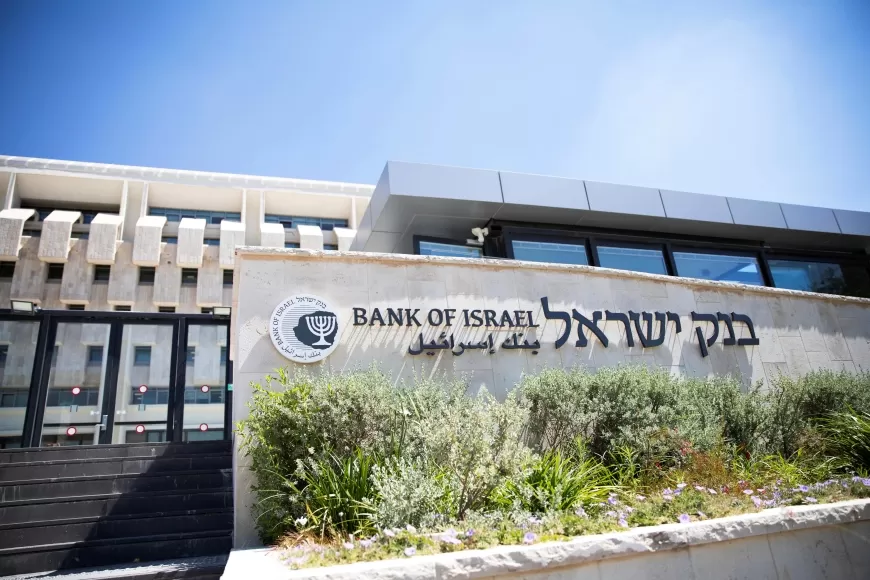Bank of Israel Keeps Rates Steady Despite Prolonged Conflict and Economic Uncertainty
Bank of Israel keeps interest rates steady amid extended conflict and economic uncertainties. Explore Israel's current economic outlook and financial strategies.

Israel’s central bank, led by Governor Amir Yaron, decided to keep its benchmark interest rate unchanged at 4.5% amidst ongoing challenges posed by prolonged conflict and economic uncertainties. This marks the fourth consecutive hold as the nation grapples with an extended period of geopolitical tension.
Yaron, in a press briefing following the decision, outlined the bank’s revised projections, anticipating the conflict to persist until early 2025. This cautious approach suggests that any potential rate cuts may not materialize until mid-2025, with a projected reduction to 4.25%.
Recent economic forecasts, released on Monday, revealed heightened concerns regarding inflation and a slowdown in economic growth compared to earlier estimates from April.
"The prolonged conflict has forced us to reassess our risk assessments," noted the Bank of Israel’s research team. They stressed the importance of gradually reducing the risk premium to effectively stabilize inflation rates.
Following the announcement, the Israeli shekel strengthened marginally against the dollar, reflecting market adjustments to the central bank's decision.
As Israel enters its tenth month of conflict with Hamas, there are mounting concerns about potential escalations, particularly with Hezbollah in Lebanon. Despite renewed talks for a Gaza cease-fire, Prime Minister Benjamin Netanyahu’s administration remains prepared for broader military responses.
The revised timeline aligns closely with assessments from national security officials, including Tzachi Hanegbi, suggesting that a resolution with Hamas may not be achieved before the end of the year.
Further instability along Israel’s northern border with Lebanon could exacerbate economic challenges, potentially leading to currency depreciation, disruptions in supply chains, and increased fiscal pressures, all contributing to inflationary risks.
Government expenditure has surged due to the conflict, resulting in one of Israel’s largest budget deficits in recent history. Fiscal data from June showed a 12-month deficit of 7.6% of GDP, surpassing the government’s projected deficit of 6.6% for the entire year of 2024.
Governor Yaron emphasized the urgent need for fiscal adjustments, estimating a requirement of 30 billion shekels ($8.2 billion) in budget cuts to achieve a deficit target of 4% of GDP by next year.
"To ensure economic stability and sustainable growth, decisive government actions are necessary, even if they are unpopular," Yaron asserted. Failure to address these challenges could heighten Israel's risk profile in global financial markets, he cautioned.
The economic uncertainties have already impacted Israel’s financial markets, with yields on the government’s 10-year shekel bonds reaching a 13-year high of 5.2% this month. Since March, the shekel has depreciated by over 3% against the dollar, making it one of the weakest performers among major global currencies tracked by Bloomberg.
Annual inflation currently stands at 2.8%, within the official target range but nearing the upper limit of 3%. Banks such as Hapoalim and Leader Capital Markets foresee inflation rising to 3.3% and possibly 3.4%, respectively, depending on fluctuations in the shekel-dollar exchange rate.
Barclays Plc economists, including Zalina Alborova, anticipated the Bank of Israel's cautious approach, ruling out further rate cuts this year despite potential geopolitical improvements. Persistent inflation pressures are expected to outweigh considerations for monetary easing.
Key Considerations:
Analysts advise monitoring how Israel navigates its fiscal policies amid ongoing conflict and global uncertainties. The upcoming budget adjustments and geopolitical developments will significantly influence Israel's economic trajectory in the coming months.
Also Read: US Jobless Claims Rise, Signaling Labor Market Challenges Ahead






























































